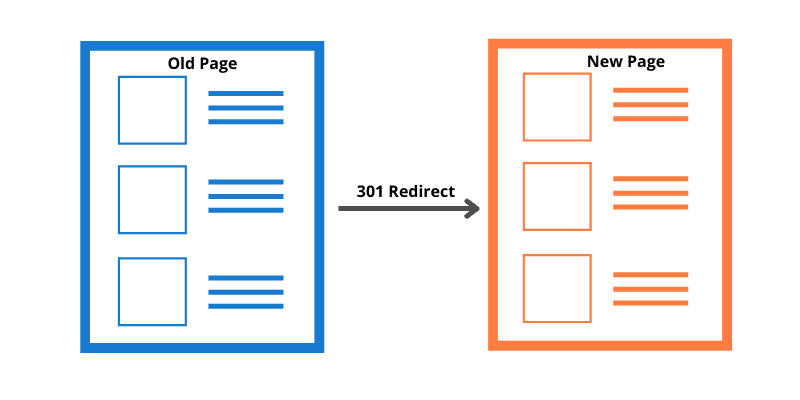Boost Organic Website Traffic by Utilizing the Potential of 301 Redirects for Search Engine Optimization
When it comes to enhancing an internet site for search engines, the tactical usage of 301 redirects can substantially affect natural traffic development. By understanding the ins and outs of 301 redirects and applying them properly, businesses can unlock the complete possibility of their SEO approaches.
Comprehending 301 Redirects Fundamentals
When beginning on the trip to comprehend 301 redirects, it is vital to understand the basic principles that underlie this vital facet of web site optimization. A 301 redirect is a permanent redirect from one link to one more. It educates internet search engine that the original URL has transferred to a brand-new area, transferring the search engine optimization worth from the old link to the new one (301 Redirect). This procedure guarantees that customers and online search engine are routed to the most existing and relevant web page, enhancing individual experience and preserving SEO positions.
Furthermore, making use of 301 reroutes appropriately can avoid individuals from running into 404 errors, improving the overall functionality of the internet site. Understanding the fundamentals of 301 redirects is foundational for any type of Search engine optimization strategy aiming to enhance web site presence and usability while preserving search engine positions.
Applying Redirect Strategies
To efficiently improve web site efficiency and individual experience, tactical implementation of redirect techniques is crucial in optimizing on the internet presence. 301 Redirect. When executing redirect techniques, it is critical to have a clear strategy in location to make sure a smooth shift for both online search engine and users. Begin by determining the pages that need to be rerouted and one of the most suitable redirect type to use, such as 301 redirects for permanent actions or 302 redirects for momentary modifications
Routinely examining and upgrading redirect approaches as needed is crucial to maintain a healthy web site and maximize organic traffic. By implementing redirect techniques successfully, internet sites can improve their SEO efficiency and give a better user experience.
Avoiding Common Redirect Mistakes
One important aspect in keeping a seamless website change during redirect execution is steering clear of usual redirect errors. In addition, stopping working to set up correct redirects for both the www and non-www versions of a website can divide link equity and trigger indexing issues. By avoiding these common redirect errors and conducting detailed testing post-implementation, website proprietors can effectively improve their Search engine optimization methods and drive natural traffic development.
Tracking Redirect Efficiency
Making sure the effectiveness and effectiveness of applied redirects includes very closely monitoring their efficiency to gauge their have a peek at this site effect on customer experience and seo initiatives. If they are effectively guiding website traffic to the desired destination, tracking the efficiency of 301 redirects is crucial in establishing. her response Using devices like Google Analytics can give important insights right into the website traffic flow before and after carrying out redirects. Monitoring the organic website traffic, bounce rates, and time invested in the redirected pages can help evaluate whether the redirects are meeting their designated goals. Furthermore, regularly looking for any errors or problems that might develop with the redirects is important to promptly address and rectify them. By continually monitoring redirect efficiency, internet site proprietors can make data-driven choices to maximize their search engine optimization strategies and enhance the total individual experience, eventually causing boosted natural web traffic and online search engine rankings.

Leveraging Redirects for SEO Development
Redirects play a pivotal duty in improving the search engine optimization (SEARCH ENGINE OPTIMIZATION) development of a web site by purposefully assisting customer web traffic towards appropriate content. When implementing redirects for SEO development, it is essential to focus on preserving link equity by redirecting old Links to brand-new, appropriate pages. Continuously evaluating the performance of redirects and making essential changes based on analytics and Search engine optimization finest practices is key to driving sustained natural website traffic growth.
Conclusion
In conclusion, implementing 301 redirects can greatly profit organic web traffic growth by successfully routing users to great post to read relevant content. Recognizing the fundamentals, implementing redirect strategies, preventing usual blunders, and keeping an eye on efficiency are important action in leveraging redirects for SEO growth. By using 301 reroutes effectively, websites can boost their internet search engine rankings and supply a far better customer experience, ultimately resulting in enhanced organic website traffic.

Monitoring the organic website traffic, bounce rates, and time spent on the rerouted pages can help examine whether the redirects are meeting their designated objectives. When implementing redirects for SEO growth, it is crucial to concentrate on maintaining web link equity by rerouting old URLs to brand-new, appropriate web pages. Recognizing the basics, carrying out redirect approaches, avoiding typical blunders, and monitoring performance are vital actions in leveraging redirects for Search engine optimization growth.